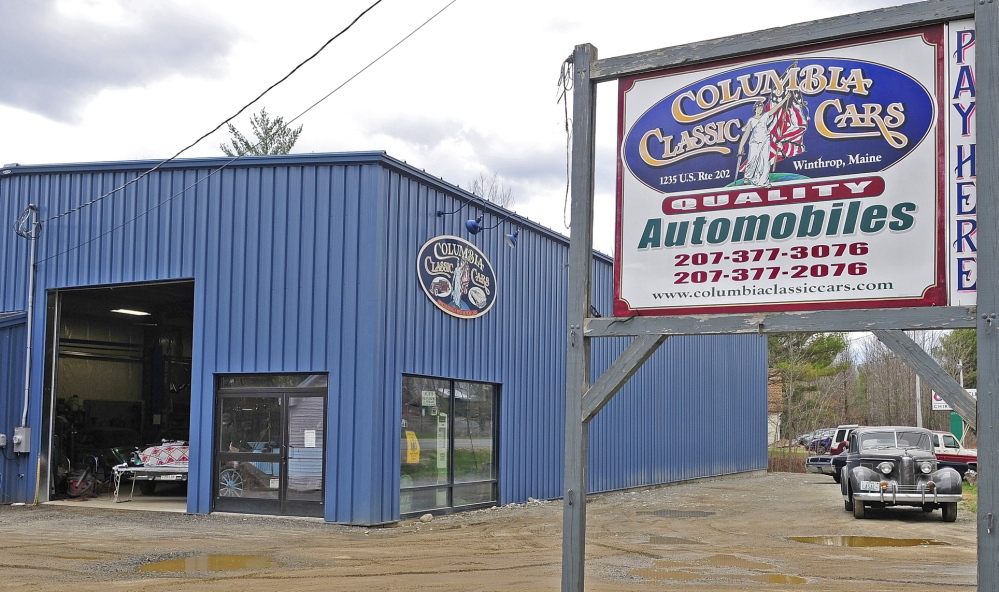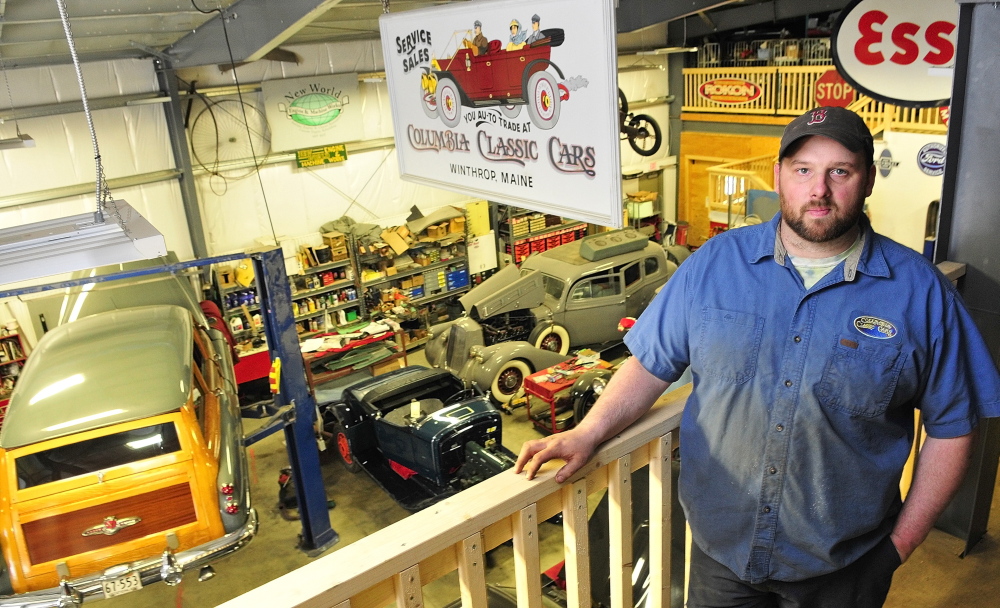WINTHROP — Columbia Classic Cars moved into its new building on U.S. Route 202 a little more than a year ago, but employees are still using a portable toilet tucked out of view behind the building thanks to a nearly $50,000 bid to connect the building to the town’s sewer line.
Columbia Manager Roy Weymouth, who says he has spent the past year working with the town and state to find a more reasonably priced solution, said there is nowhere else to turn and he fears he may lose the business as a result.
“It’s a huge hardship,” said Columbia Manager Roy Weymouth. “Fifty thousand dollars is a huge hit on top of what we’ve already borrowed to build the buildings.”
But Dan Wells, superintendent of the Winthrop Utilities District, questions the $50,000. Even if the project were that much, Wells said, there is little relief the district can offer.
“I sympathize with him, but my hands are kind of tied,” Wells said.
Trouble began in 2012 when Columbia, which is owned by Michael Fiori and employs five full-time employees to restore classic cars, decided to move out of its building on Winada Drive and into a new one it built just west of Progressive Distributors on U.S. 202.
Weymouth gathered estimates, which included a cost to connect to the town’s sewer line on the other side of U.S. 202. Weymouth said the utilities district estimated it would cost less than $5,000 to drill under the highway and connect to the pipe.
Columbia moved forward with construction. The first signs of trouble came when the building was nearly complete. Weymouth said a map of the underground terrain provided by the utilities district shows ledge running underneath Route 202 in front of the new building.
“There’s nothing but ledge out there,” Weymouth said.
Most companies haven’t been interested in even taking on the project, but one that will has estimated it will cost nearly $50,000 to complete the line if the company runs into ledge. Weymouth said the process would include reducing U.S. 202 to one lane for about a week as crews blast the ledge and lay the line.
If the contractor begins to drill, and the drill bit gets stuck in ledge, Columbia is on the hook for the cost of the drill bit, Weymouth said. He said the sewer line also will run near the water main, which Columbia would have to pay to fix if it is accidentally broken.
“It’s a huge risk,” Weymouth said. “I can’t be 100 percent sure there is ledge there, but all of a sudden the price goes through the roof if there is.”
Weymouth has balked at taking that risk and instead had plans engineered for a private septic system that would cost about $8,000, but after a year of pleading their case before the Winthrop Utilities District and multiple state agencies, Columbia is still without waste disposal.
“They say I have to tie in,” Weymouth said.
Columbia’s one-year, temporary certificate of occupancy expired at the end of April. The company cannot get a permanent certificate until it has a permanent solution for waste disposal. Weymouth said he fears the town will take action to evict the company.
“It’s always in the back of my mind,” he said. “When is it coming? When am I going to get a certified letter in the mail?”
The state law requires any commercial or private structure to tie into a commercial sewer line if that line is within 200 feet of the building. The Winthrop Utilities District statute is even stricter, reducing the mandated tie in to 125 feet. Columbia’s building is less than 100 feet from the line.
Roger Crouse, director of the drinking water program for the Maine Center for Disease Control & Prevention, said the state statute lacks a provision for a waiver. Crouse said other property owners have tried unsuccessfully to gain waivers for what they believed are exorbitant connection costs.
“This is not the first time this has come up,” Crouse said. “The answer from us is we don’t have a real involvement in this. The town has to require the builder to connect to the municipal sewer. There’s just not a lot of latitude. If you can connect to the municipal sewer, you have to.”
Weymouth believes the state does allow modifications, but Crouse said that does not include freedom to ignore the connection requirement all together.
“When we’re talking about modifications we’re talking about how you design and install,” Crouse said.
Weymouth argues that at least one other recently constructed building, one that houses Kaplan Electric on U.S. 202 about a mile away, got a waiver from connecting to the town’s sewer line when it was built in 2010. The Winthrop Hotel, across the road from Kaplan, is tied in.
But Wells said the Kaplan building, which is near the top of a steep hill, is on a pressurized line. He said the utilities district changed its rules about five years ago to prohibit tying in to pressurized lines because of the potential for “catastrophic” problems. The rule, put in place for environmental reasons, improves the integrity of the line, Wells said.
“It was determined it was too much of a risk to the district to allow that to occur,” he said.
The line in front of Columbia Classic Cars is a gravity flow.
Wells said he doubts installing the line will cost $50,000 even if the contractor hits ledge, which Wells believes is a possibility but not a guarantee. He said ledge has not impeded other property owners on Columbia’s side of the highway. Wells, who is a professional engineer, says contractors he has talked to have said laying the line would cost $20,000 or less even if they hit ledge.
Minutes of an April 2013 meeting provided by the utilities district indicate that, at that time at least, Fiori agreed.
“Mr. Fiori argued that there were exemptions given for businesses and he should be given one as well due to the cost being around $14,000 to hook up to sewer, which he feels is excessive,” the minutes read. “The trustees agreed that this was a state law and the Winthrop Utilities District has no jurisdiction.”
Weymouth and attorney Bruce Osborne, who represents Columbia, met with trustees in August of 2013 and presented a cost estimate from a local construction firm for $45,000. Osborne renewed the request for a exemption. The trustees reiterated the state law and their inability to grant an exemption.
“The trustees and staff discussed the costs and believe it to be inflated, potentially by as much as 300 percent, over what it should cost,” the minutes read. The trustees unanimously agreed to deny the waiver a month later.
Wells said if Columbia were able to get an exemption from the state, the trustees would consider whether to follow suit. Until then the district cannot approve an exemption and allow Columbia to seek town approval for a septic system, he said.
“If I say no problem, put your septic in, and the state comes in and says you can’t do that, I have to pay to put them across the road,” Wells said.
Weymouth, on the other hand, says Columbia is already over budget on construction. He said the company simply can’t spend $50,000 to install a sewer line. Without an exemption, “This business is going to be sold,” Weymouth said.
“It takes everything on this side of the highway and it decreases the value of the property by $50,000,” Weymouth said. “How could that be feasible to a residence, to a small business? It makes the entire value of the property drop significantly. It’s unreasonable not to come up with another solution.”
Craig Crosby — 621-5642 | ccrosby@centralmaine.com | Twitter: @CraigCrosby4
Send questions/comments to the editors.





Comments are no longer available on this story